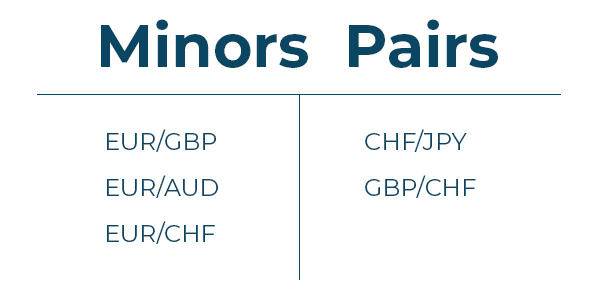What you need to know about currencies/Currencies and Currency Pairs
All currency pairs are not created equal. Currency pairs fall into a hierarchy depending on how frequently they are traded globally and their liquidity.
There are 8 major currencies. Major currencies are considered to be the most liquid and tradable out there.
They include:
 USD (United States Dollar)
USD (United States Dollar) EUR (Euro)
EUR (Euro) JPY (Japanese Yen)
JPY (Japanese Yen) GBP (British Pound)
GBP (British Pound) CHF (Swiss Franc)
CHF (Swiss Franc) CAD (Canadian Dollar)
CAD (Canadian Dollar) AUD (Australian Dollar)
AUD (Australian Dollar) NZD (New Zealand Dollar)
NZD (New Zealand Dollar)
Currency Symbols
The way the symbol for each currency is decided will become clear if you look at the initials of the corresponding country and currency’s name.
Each symbol has three letters. These letters denote the country and the currency. For example, GBP stands for British Pound and USD stands for United States Dollar.
Other important categories include the G10 currencies and BRIICS.
G10 are basically the top 10 currencies in the world. These include all the ones in the above given list along with Norwegian Krone and Swedish Krona.
BRIICS stands for Brazil, Russia, India, Indonesia, China, and South Africa-all the most important emerging economies.
Just like the currencies themselves, currency pairs too form somewhat of a hierarchy. The main categories are:
- Major Currency Pairs or Majors
- Minors or Cross Currency Pairs or Crosses
- Exotic Pairs
Majors

The pairs that are made up of the USD and another major currency are called major pairs or majors. This is because the US Dollar is the most liquid of all currencies. More than 80% of all currency pairs have USD on one side.
The major currency pairs are:
- EUR/USD
- USD/JPY
- GBP/USD
- USD/CHF
- USD/CAD
- AUD/USD
- NZD/USD
Out of the above the first four are the most frequently traded.
Minors and Cross Currency Pairs:

Currency pairs that do not contain the USD are called cross currency pairs or just “Crosses”. Crosses made up of major currencies are called minors. So out of the currencies list in the Majors sections all currencies besides USD, when paired with each other (without USD) form minors. Some examples of Minor pairs are given below:
- EUR/GBP
- EUR/AUD
- EUR/CHF
- CHF/JPY
- GBP/CHF
And so on.
Exotic Pairs:
When a major currency is paired with a currency from a developing economy such as Brazil, South Africa, or Mexico, they form Exotic Pairs. Examples of exotic pairs include:/p>
 USD/HKD- US Dollar with Hong Kong Dollar
USD/HKD- US Dollar with Hong Kong Dollar EUR/TRY- Euro with Turkish Lira
EUR/TRY- Euro with Turkish Lira GBP/ZAR- British Pound with South African Rand
GBP/ZAR- British Pound with South African Rand
Now that you know about what we’re playing with, it’s time to see how big exactly is the playing field.






